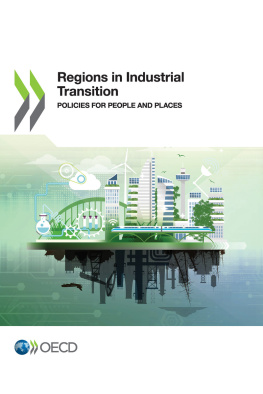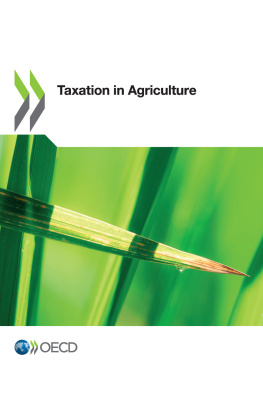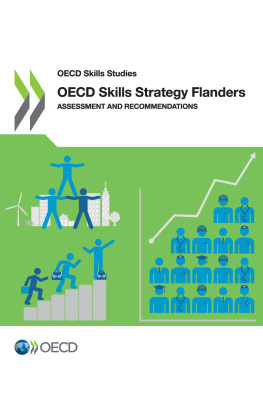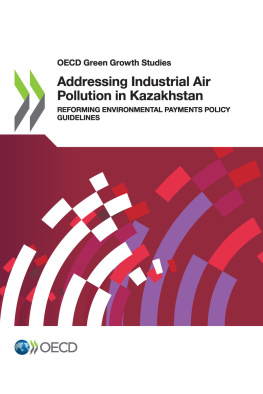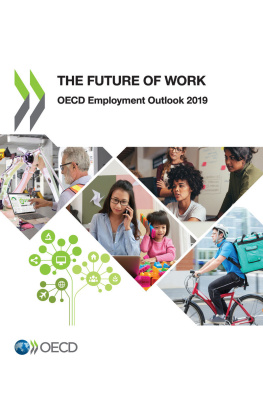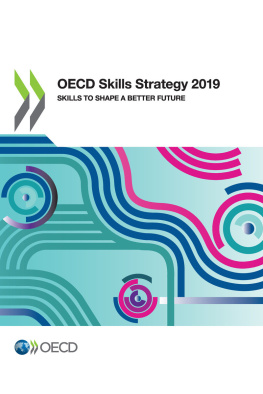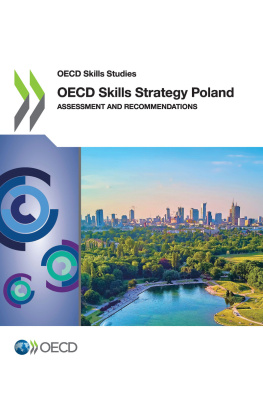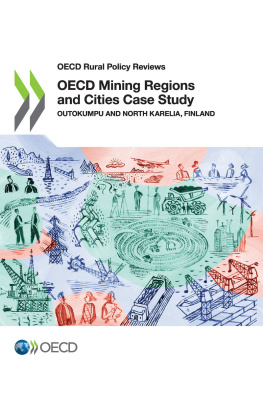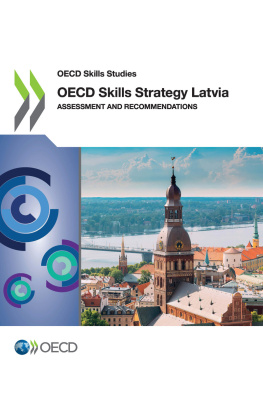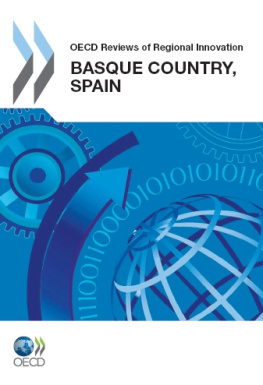OECD - Regions in Industrial Transition
Here you can read online OECD - Regions in Industrial Transition full text of the book (entire story) in english for free. Download pdf and epub, get meaning, cover and reviews about this ebook. year: 2019, publisher: OECD Publishing, genre: Politics. Description of the work, (preface) as well as reviews are available. Best literature library LitArk.com created for fans of good reading and offers a wide selection of genres:
Romance novel
Science fiction
Adventure
Detective
Science
History
Home and family
Prose
Art
Politics
Computer
Non-fiction
Religion
Business
Children
Humor
Choose a favorite category and find really read worthwhile books. Enjoy immersion in the world of imagination, feel the emotions of the characters or learn something new for yourself, make an fascinating discovery.
Regions in Industrial Transition: summary, description and annotation
We offer to read an annotation, description, summary or preface (depends on what the author of the book "Regions in Industrial Transition" wrote himself). If you haven't found the necessary information about the book — write in the comments, we will try to find it.
OECD: author's other books
Who wrote Regions in Industrial Transition? Find out the surname, the name of the author of the book and a list of all author's works by series.
Regions in Industrial Transition — read online for free the complete book (whole text) full work
Below is the text of the book, divided by pages. System saving the place of the last page read, allows you to conveniently read the book "Regions in Industrial Transition" online for free, without having to search again every time where you left off. Put a bookmark, and you can go to the page where you finished reading at any time.
Font size:
Interval:
Bookmark:
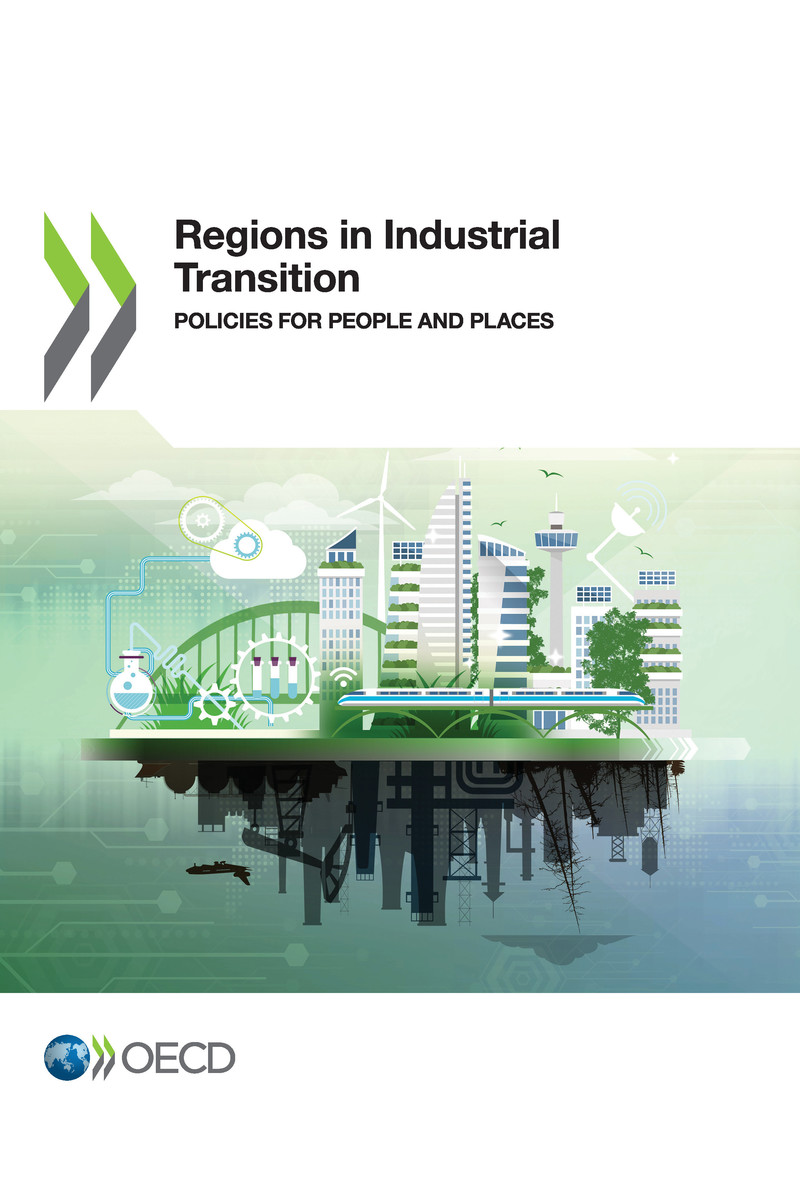
OECD (2019), Regions in Industrial Transition: Policies for People and Places , OECD Publishing, Paris, https://doi.org/10.1787/c76ec2a1-en .
This report offers guidance on how to manage industrial transition and is directed towards all policymakers seeking to improve the what and how of policies that promote industrial change. Building on frontier OECD work and regional experiences, it identifies how regions in industrial transition can become more competitive and more resilient in the context of major shifts brought about by globalisation, decarbonisation and ongoing technological change.
Industrial transition is a transformative, yet complex process. The success of industrial transition depends inherently on the ability of regions to harness the opportunities arising from industrial modernisation while at the same time limiting the costs for affected communities and workers. Regions in industrial transition typically face challenges in modernising their industrial base, upgrading the skills of the workforce, compensating for job losses in key sectors and raising low productivity that limits income growth. Overall, regions will benefit from technological progress and related developments, yet some places and certain population groups risk being left behind.
Addressing the challenges associated with long-term transformations requires active transition management on the part of policymakers and key stakeholders in regions in industrial transition. A strong place-based dimension and a tailored approach to local conditions will be essential to raise productivity and well-being in regions. Promoting development models for successful industrial transition will require building on each regions past legacy and using policy experimentation to identify the tools that best fit the local context and assets.
The report takes stock of discussions emanating from a series of peer-learning workshops jointly organised in 2018 by the European Commission (EC) and the OECD as part of the EC Pilot Action on Regions in Industrial Transition. The results of the pilot action will feed into the implementation of smart specialisation in the next generation of European Union Cohesion Policy programmes in the period 2012-2027. The report outlines the specific challenges confronting regions in industrial transition and offers guidance on how innovation-led regional development policies can facilitate a forward-looking approach to industrial transformation through policy design, implementation and monitoring. The report discusses targeted and place-based policy strategies and approaches to preparing for the jobs of the future, broadening innovation diffusion, stimulating innovative entrepreneurship, supporting the transition to a climate-neutral economy, and ensuring an inclusive and just transition in regions in industrial transition. The report also identifies a range of crosscutting lessons and key considerations that make industrial transition successful. The report underscores that there may often be a need for better rather than more policies.
This publication contributes to the broader work programme of the OECD Regional Development Policy Committee (RDPC). The initial findings of the peer-learning exercise were discussed at the 40th session of the RDPC on 8 November 2018. The report was approved by the Regional Development Policy Committee through written procedure on 11 October 2019 (CFE/RDPC(2019)11).
This report was produced by the OECD Centre for Entrepreneurship, SMEs, Regions and Cities (CFE) led by Lamia Kamal-Chaoui, Director. It is part of the Programme of Work of the OECDs Regional Development Policy Committee (RDPC).
The report is the outcome of ten one-and-a-half-day peer-learning workshops organised in 2018 by the European Commission and the OECD in the framework of the project Pilot Action on Regions in Industrial Transition: The Peer-learning Exercise. The financial contributions and support from the Directorate-General for Regional and Urban Policy (DG REGIO) are gratefully acknowledged.
The OECD Secretariat would particularly like to thank the participating regions of the peer-learning workshops, Cantabria (SP), Centre-Val de Loire (FR), East and North Finland (FI), Grand-Est (FR), Greater Manchester (UK), Hauts-de-France (FR), North Middle Sweden (SE), Piemonte (IT), Saxony (DE), Wallonia (BE), and two countries, Lithuania and Slovenia. Many of the examples and insights in this report come from the discussions, findings and conclusions derived from the peer-learning workshops.
Several experts and regional and country representatives contributed their perspectives to inform this report. The team would like to thank the following external experts for their contributions to the workshops: Ryan Glenn, Director of State-wide Initiatives, Ben Franklin Technology Partners, Pennsylvania, U.S; Johanna Lundstrm, Chief Analyst, Regional Development, Strategy and Analysis, Region Syddanmark, Denmark; Cristina Oyn, Head of Strategic Initiatives, GRUPO SPRI TALDEA, Bilbao, Spain; Professor William Swan, Associate Dean Enterprise, School of the Built Environment, Salford University; and Michael Theben, Director General for Climate Protection, Ministry for Economic Affairs, Innovation, Digitalization and Energy, North Rhine Westphalia, Germany. Within the OECD particular thanks goes to Jonathan Barr (CFE), David Bartolini (CFE), Enrico Botta (ENV), Mario Cervantes (STI), Enrique Garcilazo (CFE), Sylvain Giguere (CFE), Sandrine Kergroach (CFE), Lukas Kleine-Rueschkamp (CFE), Alexander Lembcke (CFE), Virginie Marchal (ENV), Alistair Nolan (STI), Jonathan Potter (CFE), Andres Sanabria (CFE), and Paolo Veneri (CFE). Inputs and comments from delegates of the Regional Development Policy Committee are also gratefully acknowledged.
The peer-learning workshops were co-ordinated in CFE by Maria Varinia Michalun and Debra Mountford and the final report was co-ordinated and drafted by Sandra Hannig, all under the supervision of Rdiger Ahrend, Head of the Economic Analysis, Statistics and Multi-level Governance Section in CFE. Each chapter builds on in-house background papers as well as the workshop discussions. Maria Varinia Michalun provided input and edited the report. Eric Gonnard provided statistical input. The report benefited from valuable comments by Rdiger Ahrend, Maria Varinia Michalun and Debra Mountford at the OECD, and Peter Berkowitz, Richard Deiss, Sander Haepperts, Laurent de Mercey, Denisa Perrin and Marek Przeor at the European Commission. The report was copy-edited by Eleonore Morena and prepared for publication by Francois Iglesias and Pilar Philip.
Font size:
Interval:
Bookmark:
Similar books «Regions in Industrial Transition»
Look at similar books to Regions in Industrial Transition. We have selected literature similar in name and meaning in the hope of providing readers with more options to find new, interesting, not yet read works.
Discussion, reviews of the book Regions in Industrial Transition and just readers' own opinions. Leave your comments, write what you think about the work, its meaning or the main characters. Specify what exactly you liked and what you didn't like, and why you think so.

